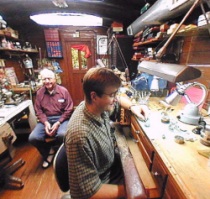FREQUENTLY ASKED QUESTIONS
We often get several of the same questions about watches so we compiled them into this list for your information. Please feel free to read the Q & A’s and leave comments if you have more information on a topic.
Why Is My Watch Loosing Time?
More often than not the cause of inaccurate timekeeping is due to contamination and breaking down of the lubricants within the watch. A cleaning to remove the old lubricants and dirt, followed by an application of fresh lubricant and finally fine adjusting the watch is usually all that is needed for a watch that is functioning properly in all other respects. There are other issues that can affect timekeeping and many of the possibilities are addressed in an excellent article that was originally published in 1941 and is entitled, “My watch has stopped-Why?”.
How Much Does A Repair Cost?
It is not possible to provide an exact cost to repair a watch until it can be thoroughly examined. A very close estimate can be provided if complete details concerning the issues and problems that exist are sent to us along with any known service history and clear closeup photos of the front of the watch and the movement.
What Is My Watch Worth? I Inherited A Watch, What Can You Tell
Me About It?
We provide appraisals for antique and vintage pocket and wrist watches. We also can provide you with some limited history and value information when you send photos of the front, back, inside back and movement of your watch.
How do I safely ship my watch for repair?
Please refer to our webpage devoted exclusively to the proper procedures for packaging and shipping your watch at this link. Shipping a watch to us.
Do you guarantee your work?
Yes, we guarantee all work that we perform for a period of one year from date of service. If during this period your watch fails to function properly we will take care of it at no charge providing the failure was due to a new component we installed or a service we performed and has not been subject to damage by negligence or abuse. Before any watch is returned for warranty repair we ask that you call and discuss the symptoms. Often the watch does not have to be returned after some questions have been answered.
How often should I wind my watch?
Most watches require winding daily if they are being used daily. The run time for most manual wind watches is around 35 hours per wind when fully wound.
Do you recommend automatic watch winders when my watch is
not being used?
This is totally up to you and your watch wearing habits. The function of a watch winder is to keep the watch running even when it is not being used. The only time a watch suffers any mechanical wear is when it is running. The winder maintains a constant state of wear to every watch that is kept on the winder. The more a watch is running the shorter the life of the watch. An exaggerated example would be for a car enthusiast to have all cars in the collection attached to a fuel supply and running it the garage so they would be warmed up and ready to go when the urge hit. This is not to say that some extremely complicated perpetual calendar watches that require so much time to reset when stopped might benefit the wearer by being kept on a winder.
Can I overwind my watch?
Simply no. This is what is referred to as “an old wives tale”. All watches were produced to be wound daily without having to be concerned about breaking the watch when it was wound every day. The reason this question arises is due to the process that occurs when a watch is wound. Usually the watch is wound up tight as required and it is not until the watch is wound that it is discovered that it is not running. The immediate assumption is that the watch was just wound too tight when that is really not the case. It just happens to be that is when the watch was discovered to not be working due to either a blockage in the watch or an unrelated broken part. Since the watch is now wound up fully the only way for it to unwind is to run it will remain wound fully until it is serviced or repaired.


